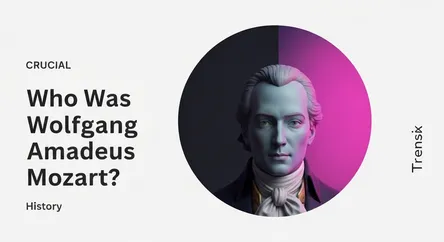History
Who Was Wolfgang Amadeus Mozart?

An overview of Wolfgang Amadeus Mozart, the brilliant Classical composer whose vast works and prodigious talent continue to influence music worldwide.
What is it?
Wolfgang Amadeus Mozart (1756-1791) was a prolific and highly influential Austrian composer of the Classical period. A remarkable child prodigy, he began composing at age five and wrote more than 800 works in his short life, excelling in every genre of his time. Born in Salzburg, he displayed prodigious ability on the keyboard and violin from his earliest childhood. His compositions include iconic operas like The Marriage of Figaro and The Magic Flute, numerous symphonies, piano concertos, and his famous unfinished Requiem. Mozart is widely regarded as one of the greatest composers in the history of Western music.
Why is it trending?
Centuries after his death, Mozart's work remains immensely popular and continuously performed worldwide. His music is considered timeless due to its melodic beauty, formal elegance, and emotional depth, which resonates with audiences universally. The story of his genius, from child prodigy to celebrated master, continues to fascinate, inspiring countless books, films, and documentaries. His compositions are instantly recognizable and serve as a gateway to classical music for many, ensuring his constant presence in concert halls and digital playlists, keeping his legacy vibrant and relevant.
How does it affect people?
Mozart's influence is widespread and deeply embedded in modern culture. His music is a cornerstone of classical education and is frequently used in film, television, and advertising to add elegance and emotional depth. Many believe his compositions can enhance cognitive development and emotional well-being. Beyond entertainment, his work transcends cultural barriers, fostering a global appreciation for the arts. He revolutionized the opera and perfected forms like the symphony and concerto, profoundly shaping the course of music and influencing generations of composers, including Ludwig van Beethoven.